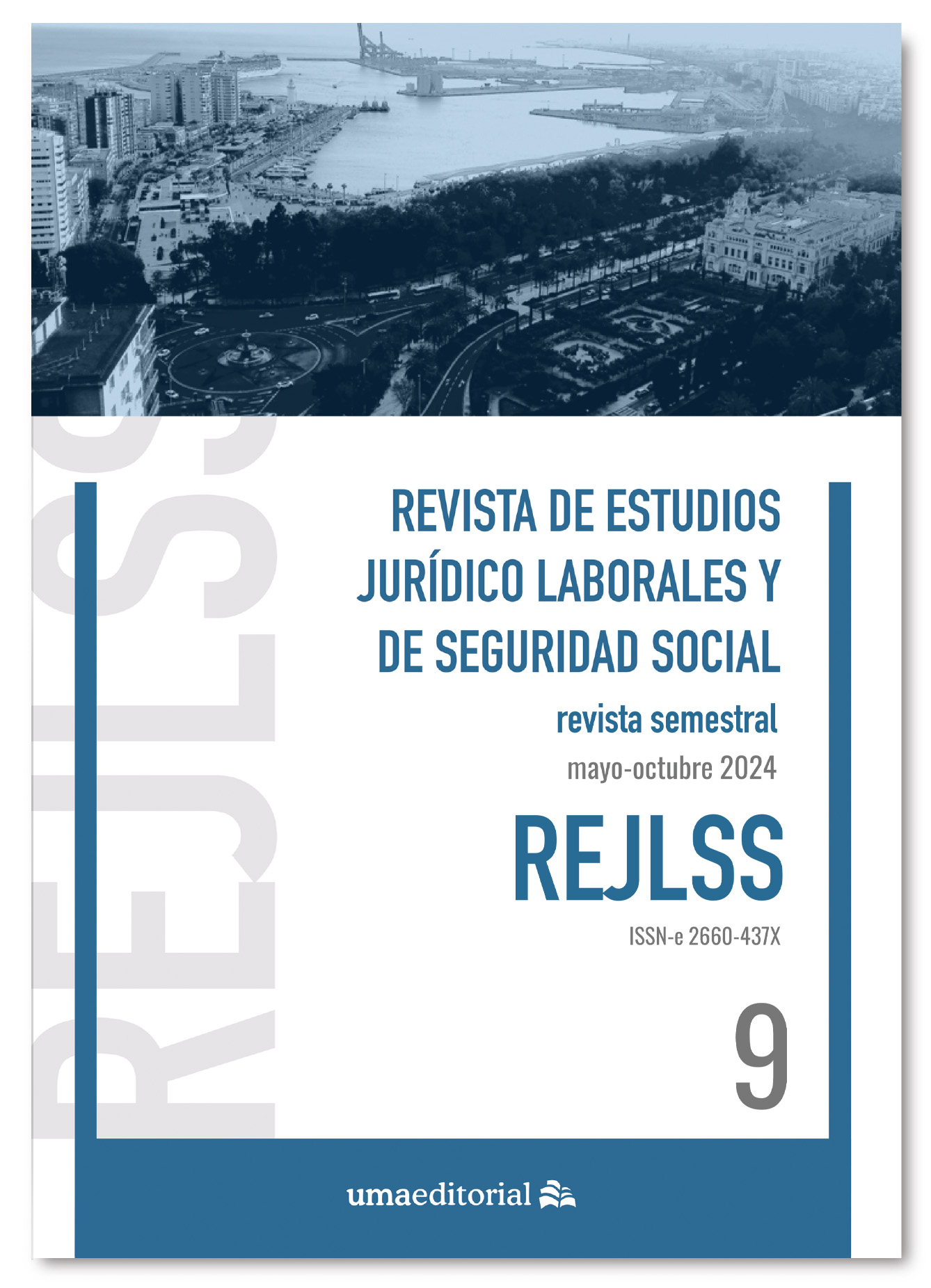Vejez, remuneración y ley: la inmutabilidad del derecho pensional ante el Código de Familia nicaragüense
DOI:
https://doi.org/10.24310/rejlss9202419852Palabras clave:
Senectud, ancianidad, compatibilidad, pensión de vejez, NicaraguaResumen
El artículo examina el impacto de la entrada en vigor del Código de Familia nicaragüense, especialmente su influencia para los pensionados por vejez, quienes asumieron que podían compaginar la percepción de la prestación económica con el acceso a un empleo.
La investigación representa una novedad en el contexto nicaragüense al abordar si los pensionados por vejez pueden compaginar sin restricción el disfrute de su pensión con un empleo, proponiendo soluciones y evidenciando las necesidad de reforma en la configuración del seguro social, a la vez, se enfoca en describir la ambigüedad legal y el oportunismo surgido del desorden normativo.
Descargas
Métricas
Publicación Facts
Perfil de revisores N/D
Información adicional autores
Indexado: {$indexList}
-
Indexado en
- Sociedad Académica/Grupo
- N/D
- Editora:
- Universidad de Málaga. UMA Editorial
Citas
Abboud Castillo, N. L., Código de familia de la república de Nicaragua: incluye estudio introductorio, Facultad de Ciencias Jurídicas UCA, Managua, 2015.
Alemán-Madrigal, L. E., “Evolución de la protección social y su adecuación en Nicaragua”, E-Revista Internacional De La Protección Social, vol. 3, núm. 2, 2023.
Cabanellas de Torres, G., Diccionario enciclopédico de derecho usual, tomo IV: F-K, 30ª ed., Healiasta, Buenos Aires, 2008.
Díaz Rodríguez, J. M., “La incompatibilidad entre prestaciones y trabajo, según la Ley General de Seguridad Social”, Documentación Laboral, vol. 1, núm. 103, 2015.
Etala, C. A., Derecho de la Seguridad Social, 3ª ed., Editorial Astrea de Alfredo y Ricardo Depalma, Buenos Aires, 2007.
Fernández Orrico, F. J., “La compatibilidad de la pensión de jubilación con el trabajo en la Unión Europea: una manifestación de las políticas de envejecimiento activo (con especial atención a España y Portugal)”, Revista De Trabajo y Seguridad Social. CEF, núm. 417, 2017. DOI: https://doi.org/10.51302/rtss.2017.1730
Gorelli Hernández, J., Vílchez Porras, M., Álvarez Alcolea, M., de Val Tena, A. L. y Gutiérrez Pérez, M., Lecciones de Seguridad Social, 4ª ed., Tecnos, Madrid, 2014.
Herreros López, J. M., “Estudio constitucional del derecho a una pensión de jubilación”, Revista De Trabajo Y Seguridad Social. CEF, núm. 351, 2012. DOI: https://doi.org/10.51302/rtss.2012.3419
Instituto Nicaragüense de Seguridad Social, Anuario Estadístico 2022, Instituto Nicaragüense de Seguridad Social, Managua, 2023.
López Insua, B. M., “Impulsando un nuevo modelo de “envejecimiento activo”: la compatibilidad entre trabajo-pensión versus jubilación y otras prestaciones del sistema de Seguridad Social”, Revista Internacional Y
Comparada De Relaciones Laborales Y Derecho Del Empleo, vol. 10, núm. 4, 2022.
Martínez Girón, J, Arufe Vela, A. y Carril Vásquez, X. M., Derecho de la Seguridad Social, 2ª ed., Netbiblo, Madrid, 2008.
Navarro, K., La Seguridad Social en Nicaragua: Antecedentes Histórico-Jurídicos, BITECSA, Managua, 2003.
Porras Delgado, A. E., “Aspectos jurídicos de la propuesta de reforma al sistema de pensiones del INSS”, Tesis de Maestría, Universidad Centroamericana, Managua, 2011.
Rizo Castellón, S., Seguridad Social para el Siglo XXI, Editronic, Managua, 1996.
Rodríguez Samblás, S. y Requena Montes, O., “Jubilación parcial y contrato de relevo: regulación y prospectiva”, Lan Harremanak - Revista De Relaciones Laborales, núm. 46, 2022. DOI: https://doi.org/10.1387/lan-harremanak.22937
Ruiz Arias, M., Derecho del sistema de Seguridad Social, Vicerrectoría de investigación y postgrado UNICA. Texto autoformativo Maestría en Derecho Laboral y Seguridad Social. IV Edición, Managua, 2017.
Velasco, J., “El Supremo solo ve compatible cobrar la pensión de gran invalidez con un trabajo si es puntual”, El País, 03 de mayo de 2024, en https://cincodias.elpais.com/legal/2024-05-03/el-supremo-rectifica-solo-es-compatible-cobrar-la-pension-de-gran-invalidez-con-un-trabajo-si-es-puntual.html
Vida Soria, J., Monereo Pérez, J. L., Molina Navarrete, C., y Quesada Segura, R., Manual de Seguridad Social, 5ª ed., Tecnos, Madrid, 2009.
Publicado
Cómo citar
Número
Sección
Licencia
Derechos de autor 2024 Luis Ernesto Alemán Madrigal

Esta obra está bajo una licencia internacional Creative Commons Atribución-NoComercial-SinDerivadas 4.0.
En la Revista de Estudios Jurídico Laborales y de Seguridad Social (REJLSS) apostamos claramente por una política de acceso abierto del conocimiento científico (Veáse Declaración de Berlín).
Aquellos autores/as que tengan publicaciones con esta revista, aceptan los términos siguientes:
-
Esta revista provee acceso libre inmediato a su contenido bajo el principio de hacer disponible gratuitamente la investigación al público. Todos los contenidos publicados en la REJLSS, están sujetos a la licencia de Creative Commons
Atribución-NoComercial-SinDerivadas 4.0 Internacional (CC BY-NC-ND 4.0)
Los derechos de autor son de dos clases: morales y patrimoniales. Los derechos morales son prerrogativas perpetuas, irrenunciables, intransferibles, inalienables, inembargables e imprescriptibles. De acuerdo con la legislación española de derechos de autor, Los autores que publican en REJLSS conservan el derecho moral sobre su obra, así como la titularidad del derecho patrimonial, el cual será cedido a la Universidad de Málaga para su difusión en acceso abierto.
Los derechos patrimoniales, se refieren a los beneficios que se obtienen por el uso o divulgación de las obras. REJLSS se publica en open access y queda autorizada en exclusiva para realizar u autorizar por cualquier medio el uso, distribución, divulgación, reproducción, adaptación, traducción o transformación de la obra.
Es responsabilidad de los autores/as obtener los permisos necesarios de las imágenes que están sujetas a derechos de autor.
Los autores-as cuyas contribuciones sean aceptadas para su publicación en esta revista conservarán el derecho no exclusivo de utilizar sus contribuciones con fines académicos, de investigación y educativos, incluyendo el auto-archivo o depósito en repositorios de acceso abierto de cualquier tipo.
La edición electrónica de esta revista esta editada por la Editorial de la Universidad de Málaga (UmaEditorial), siendo necesario citar la procedencia en cualquier reproducción parcial o total.
- Los-as autores-as podrán adoptar otros acuerdos de licencia no exclusiva de distribución de la versión de la obra publicada (p. ej.: depositarla en un archivo telemático institucional o publicarla en un volumen monográfico) siempre que se indique la publicación inicial en esta revista.
- Se permite y recomienda a los-as autores-as difundir su obra a través de Internet (p. ej.: en archivos telemáticos institucionales o en su página web) antes y durante el proceso de envío, lo cual puede producir intercambios interesantes y aumentar las citas de la obra publicada.







19.png)
